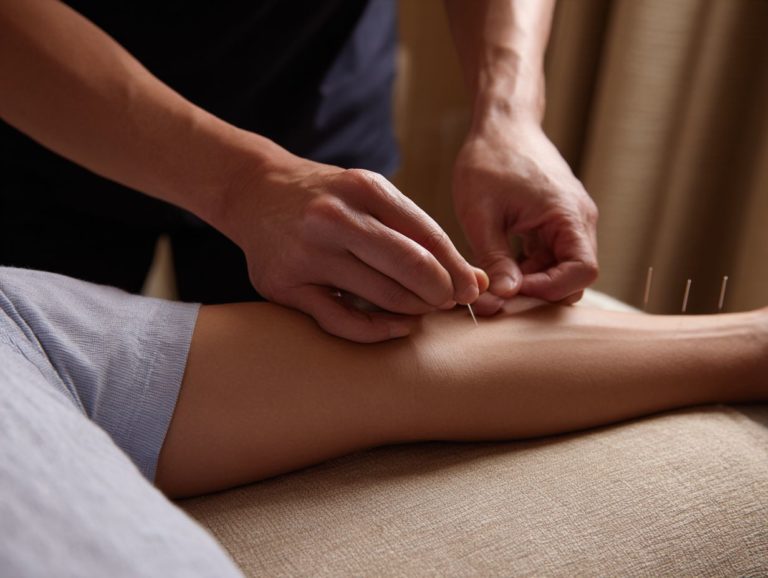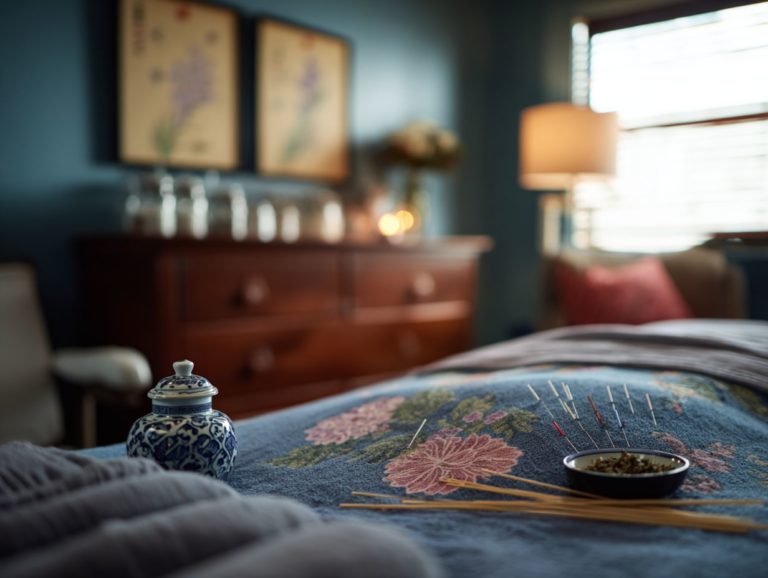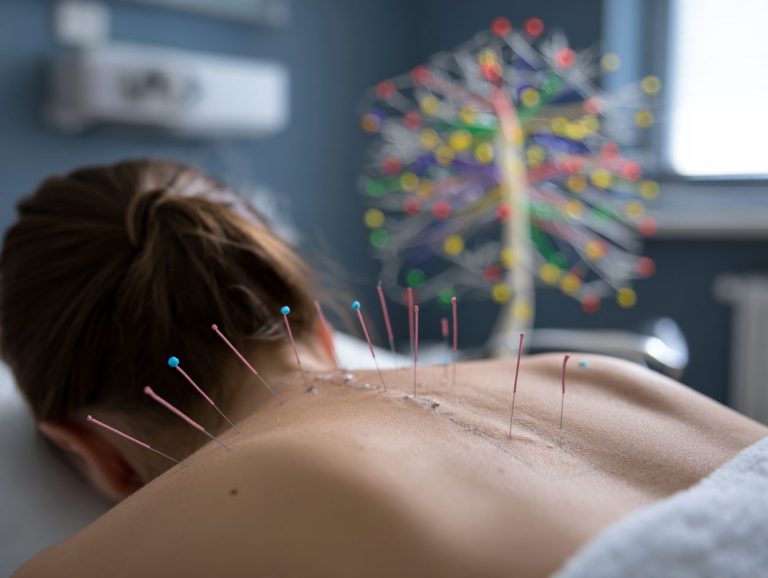Acupuncture Session Duration: Timing and Frequency
Acupuncture, an ancient practice rooted in Traditional Chinese Medicine Provides a complete method for healing by carefully placing thin needles.
If you’re curious about how long an acupuncture session typically lasts or how often you should schedule treatments, you’re in the right place.
This article looks at how long acupuncture sessions last, how often you should have them, what affects these factors, and the best time to schedule your appointments.
Learn how to get the most out of your acupuncture session for maximum benefits!
Key Takeaways:
- The duration of an acupuncture session can vary, but it is typically between 20-60 minutes.
- The recommended frequency of acupuncture sessions is usually once or twice a week, depending on the individual’s condition and response to treatment.
- The timing of acupuncture sessions can be in the morning, afternoon, or evening, depending on the person’s schedule and preference.
Contents
- 1 What is Acupuncture?
- 2 Acupuncture Session Statistics
- 3 How Long is an Acupuncture Session?
- 4 What is the Recommended Frequency of Acupuncture Sessions?
- 5 What Factors Can Affect the Duration and Frequency of Acupuncture Sessions?
- 6 What is the Ideal Timing for Acupuncture Sessions?
- 7 How Long Should Someone Continue Acupuncture Treatment?
- 8 Frequently Asked Questions
- 8.1 What is the recommended duration for an acupuncture session?
- 8.2 How often should I schedule acupuncture sessions?
- 8.3 Can the duration of an acupuncture session vary?
- 8.4 Is there a specific time of day that is best for acupuncture sessions?
- 8.5 Are there any factors that can affect the duration of an acupuncture session?
- 8.6 Is it necessary to continue acupuncture sessions after the symptoms have improved?
What is Acupuncture?

Acupuncture is a treatment from Traditional Chinese Medicine that helps reduce long-term pain and improves overall health by targeting specific points on the body. According to Verywell Health, Traditional Chinese Medicine emphasizes balance and harmony within the body, which supports acupuncture’s role in enhancing energy flow.
This old method helps improve energy flow (Qi) to encourage natural healing and balance, making it a popular choice for managing pain without using Western medicine. For an extensive analysis of this trend, our comprehensive study of acupuncture techniques and benefits offers deeper insights into its effectiveness and applications.
Acupuncture Session Statistics
Acupuncture Session Statistics
Acupuncture is increasingly being integrated into mainstream medical practices due to its effectiveness in managing chronic pain. This trend is supported by recent findings from Time magazine, highlighting the growing acceptance of acupuncture in the field of medicine.
Acupuncture Clinical Trials: Trial Findings
Acupuncture Clinical Trials: Acupuncture Practices
The Acupuncture Session Statistics give details about clinical trials and practices in acupuncture, concentrating on study results related to how long sessions last, how often they are held, and the techniques used. This data is important for knowing how well acupuncture treatments work and how they are applied.
Acupuncture Clinical Trials data reveals that Half of randomized controlled trials (RCTs) use Traditional Chinese Methods Many studies follow traditional methods, which are often seen as essential and complete in their approach. These findings suggest a balanced interest in both traditional and modern techniques among researchers.
- Patients Receiving 6 to 15 Sessions: 80% of patients underwent between 6 to 15 sessions, indicating a common treatment protocol aimed at achieving therapeutic benefits through repeated exposure to acupuncture stimuli. This frequency suggests an optimal range for patient engagement and potential health improvements.
- Sessions Lasting < 30 Minutes: 50% of sessions lasted less than 30 minutes, reflecting a trend towards shorter, potentially more efficient sessions. This duration may cater to patients’ preferences for convenient, quick treatments while still providing therapeutic effects.
Acupuncture Practices encompass data from a meta-analysis involving 20,827 patients, showcasing the extensive reach and impact of acupuncture studies. This large sample size provides a strong foundation for assessing how well acupuncture works for different groups of patients.
- The inclusion of 39 RCTs The meta-analysis presents a detailed review of previous studies, helping to clarify acupuncture’s place in healthcare.
Overall, the Acupuncture Session Statistics Provide useful information about how acupuncture works, focusing on common methods, the best number of sessions, and effective treatment times. These findings show that acupuncture is still important and useful in today’s healthcare environments.
How Long is an Acupuncture Session?
The length of an acupuncture session varies depending on the individual’s treatment plan and health issues, typically lasting from 30 to 90 minutes.
During this time, an acupuncturist will check the patient’s condition, discuss treatment goals, and place needles at various points to relieve pain and improve overall health.
How is the Session Time Determined?
The length of an acupuncture session is based on a treatment plan that considers the patient’s health benefits, condition severity, and personal pain relief goals. Practitioners may adjust the duration of sessions according to the effectiveness of the treatment and the patient’s response.
During the first meeting, acupuncturists examine patients carefully by talking about their medical background, present symptoms, and any lifestyle habits that might affect the results of the treatment.
This careful assessment enables practitioners to tailor their approach, ensuring that each session is aligned with the unique needs of the patient.
For instance, if a patient expresses higher levels of pain or stress, clinicians may opt for longer sessions to provide more extensive relief. By tailoring treatment plans based on these assessments, acupuncturists increase the chances of successful pain relief, leading to a more satisfying recovery process.
What is the Recommended Frequency of Acupuncture Sessions?
How often you should have acupuncture sessions depends on the type of chronic pain, how you respond to the treatment, and your health goals.
Some people find weekly sessions helpful, while others might not need them as often. This specific method manages pain and symptoms well over time, as noted by the Mayo Clinic, a respected source in health and medicine. Additionally, exploring different techniques such as ear acupuncture can provide further benefits and techniques to enhance your treatment.
How Often Should Someone Receive Acupuncture Treatment?
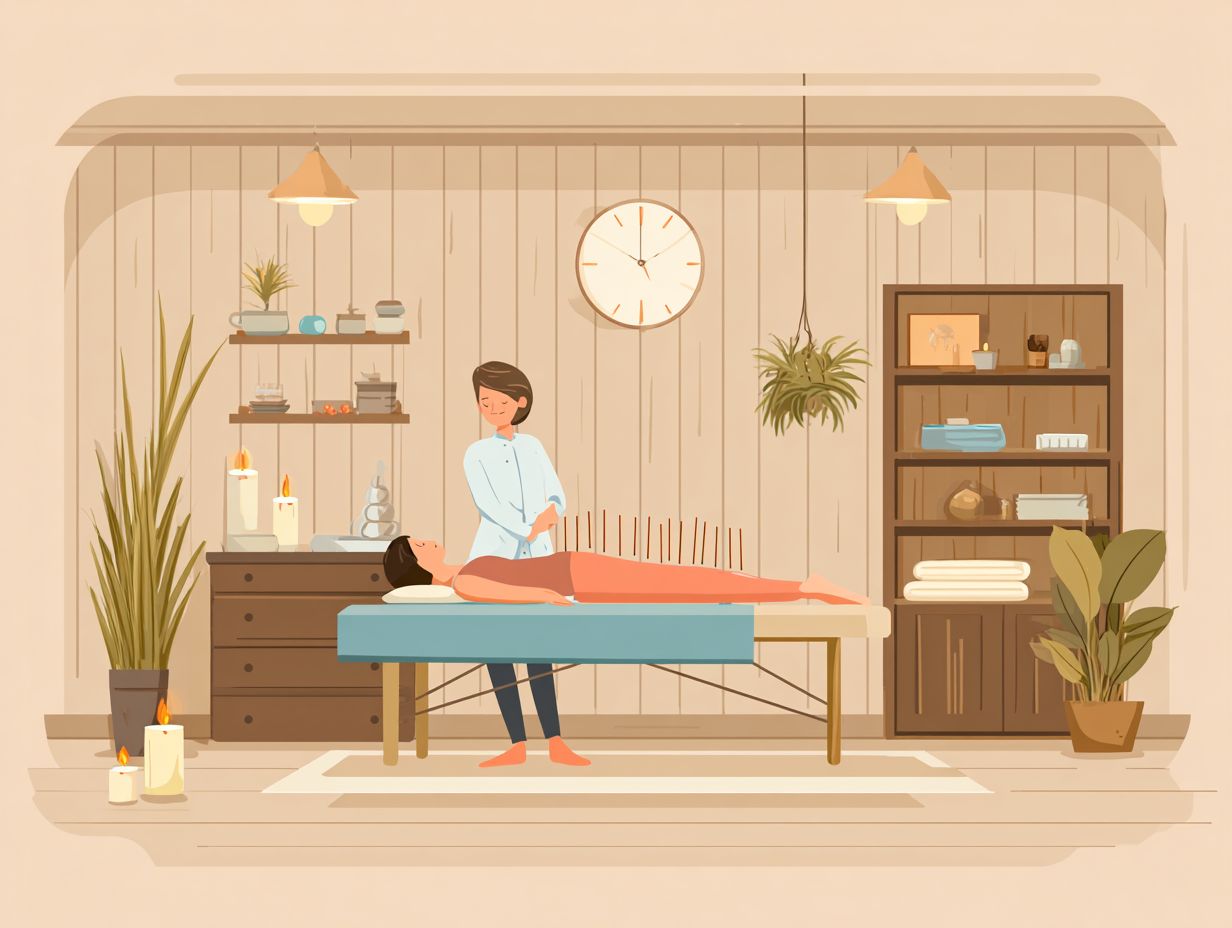
The frequency at which someone should receive acupuncture treatment often depends on their unique treatment schedule and the specifics of their health condition, such as chronic pain disorders like fibromyalgia or knee osteoarthritis. While some may find relief with weekly sessions, others may need bi-weekly or monthly visits to maintain their health benefits.
The differences come from how each person reacts to treatment, how bad the condition is, and general lifestyle habits.
For example, someone suffering from acute pain might require more frequent sessions initially to help stabilize their symptoms, while those with longstanding conditions may benefit from a more spaced-out approach after achieving initial relief.
The key to successful treatment is keeping track of patient progress and changing the frequency as needed to get the best results for each person’s path to health.
Does Acupuncture hurt? When the thin, sterile needles are inserted into the skin, you may feel a slight pinch or prick, but it is typically not painful. Read more on what does acupuncture feels like here.
Is There a Limit to the Number of Acupuncture Sessions Someone Can Have?
There is usually no set limit to how many acupuncture sessions a person can attend. However, it’s necessary to assess the effectiveness of the treatment by using tools like the Visual Analogue Scale or other pain measurement scales. Regular assessments help determine whether to continue, modify, or conclude the treatment regimen based on individual progress.
In acupuncture, practitioners closely watch how patients react during several treatments. This ongoing evaluation process allows them to identify patterns in pain relief, emotional well-being, and overall health improvements.
By observing these changes, practitioners can make informed decisions about adjusting treatment frequency, introducing new techniques, or even discontinuing sessions if the desired outcomes have been achieved.
The process of personal healing emphasizes the need for continual assessment, ensuring the patient receives customized treatment for long-term pain relief and well-being.
What Factors Can Affect the Duration and Frequency of Acupuncture Sessions?
The length and number of acupuncture sessions can be affected by various factors, including the type of chronic pain being treated, how the person responds to acupuncture, the seriousness of their symptoms, and their general health. Understanding the appropriate acupuncture techniques and needle placement is crucial in addressing these factors effectively, as highlighted in our discussion on acupuncture points and techniques.
Each person’s physical and mental condition is important in figuring out the best treatment plan.
1. Condition Being Treated
The condition being treated greatly influences how many acupuncture sessions are needed and how long they last. For example, ongoing pain from knee osteoarthritis or plantar fasciitis might need more sessions than milder symptoms.
For example, patients with long-term prostatitis might find that a structured treatment plan using acupuncture can offer significant relief. However, they might have to adjust the frequency of their sessions depending on the seriousness of their symptoms and how these symptoms develop.
Similarly, individuals suffering from myofascial pain may experience varying degrees of benefit, with some requiring intensive therapy sessions to address deeper muscle layers effectively.
Research shows that how often acupuncture is done can differ a lot. This shows why it’s important to have treatment plans that fit the individual. Research shows that people with serious, long-term problems tend to get better with regular treatments, compared to those with milder issues.
The differences highlight the important need for healthcare providers to evaluate each patient’s specific situation and change treatment plans as needed.
2. Individual Response to Treatment
Each individual’s response to acupuncture treatment can vary greatly, influencing how long and how often they should receive sessions to maximize health benefits and pain relief. Factors such as age, lifestyle, and existing health issues can affect overall effectiveness.
Besides these basic factors, personal traits such as metabolism, stress levels, and personal expectations also significantly influence treatment results.
For instance, someone with a faster metabolism may process the effects of acupuncture differently than another who tends to have a slower metabolic rate. Similarly, high levels of stress can alter a person’s responsiveness to treatment, leading practitioners to consider these emotional and physiological dimensions.
The expectations a patient holds can significantly influence their perceived efficacy of the treatment. By looking at these details, practitioners can create individual treatment plans that can change when needed, ensuring each person receives the most appropriate care.
3. Severity of Symptoms
The intensity of symptoms is a key factor in deciding how long and how often someone should receive acupuncture. Patients with severe ongoing pain may begin with more regular sessions and change the frequency depending on their comfort level.
Doctors monitor the patient’s progress by looking at how severe their symptoms are and how they respond to the treatment over time.
Studies indicate that individuals with worse symptoms often see greater progress with more regular sessions, as these offer consistent and targeted care.
As patients improve, treatment plans can be changed to include fewer sessions. This keeps care effective and matches the patient’s needs as they change.
This adaptable approach is key for better outcomes and increasing the effectiveness of acupuncture therapy.
4. Overall Health and Wellness
A patient’s overall health and wellness significantly influence the effectiveness and frequency of acupuncture sessions, as those with better health may respond more positively and require fewer visits to achieve pain relief compared to those with comorbidities.
Aspects such as lifestyle choices-like physical activity levels and sleep quality-play a critical role in determining how one benefits from this traditional therapy. Eating a diet rich in whole foods can improve healing in the body, which makes acupuncture work better.
An individual’s psychological health often bears a weighty influence; stress and anxiety might diminish the treatment’s effectiveness. Therefore, practitioners typically assess these factors at the beginning and continue to monitor them during treatment to modify their approach, making acupuncture more personalized and effective.
What is the Ideal Timing for Acupuncture Sessions?

The best time for acupuncture sessions can differ for each person, usually based on their daily routine and way of living.
Booking sessions at times believed to be optimal can make the treatment more effective. Morning, afternoon, and evening sessions each have their own advantages. For those new to the process, understanding acupuncture treatment procedures and recovery can help in planning the best session times.
1. Morning Sessions
Morning sessions of acupuncture can be helpful for people wanting to improve their energy and start the day on a good note. They often help reduce chronic pain symptoms before daily tasks begin.
This method helps people start their day more actively and stay engaged. It can improve mental clarity, allowing them to handle tasks with better focus.
Those managing conditions such as anxiety or insomnia may find morning treatments particularly useful, as they can help regulate mood and promote a sense of calm, which permeates through the day.
When patients feel less pain early, they are more likely to be active, which can make them feel good and get things done throughout the afternoon.
2. Afternoon Sessions
Getting acupuncture in the afternoon can be a great way to relax and ease stress. It can help reduce soreness and tension that develop during the day, which is helpful for people with neck pain or shoulder discomfort.
By choosing this timing, individuals can seamlessly integrate a restorative practice into their routine, allowing for mental clarity and increased focus as they move through the remainder of their day.
The calming effects of acupuncture are particularly useful for unwinding after a hectic morning, as the treatment promotes the release of endorphins, which are known for their natural pain-relieving properties.
The calm atmosphere of an afternoon session can make the experience better, allowing patients to escape the noise and refresh their bodies and minds, which helps them handle daily stress better.
3. Evening Sessions
Evening acupuncture sessions can be particularly effective for promoting better sleep quality, as they allow patients to unwind and release the accumulated tension of the day, which can be especially helpful for those struggling with insomnia or anxiety-related conditions.
A lot of people have mentioned that after going to these sessions, they feel calmer, which helps them sleep better.
A patient with long-term headaches found that having an evening appointment in a calm setting eased her pain and improved her sleep, leading to a deeper and more restful night.
Some people who face high stress from job demands found that spending time in the evening for acupuncture reduced their anxiety and taught them relaxation methods that improved their general well-being.
These sessions create a peaceful setting, helping patients feel calm even after the treatment, which supports improving sleep habits.
How Long Should Someone Continue Acupuncture Treatment?
How long acupuncture treatment lasts usually depends on what each person wants to achieve. Many patients keep going until they feel better, while others might need regular sessions for long-term conditions to keep pain at bay and stay healthy.
1. Until Symptoms Improve
Many patients keep getting acupuncture until they notice big improvements in their symptoms, like less chronic pain or better overall health and energy levels.
Throughout this process, practitioners often evaluate progress by using different techniques, such as patient feedback and monitoring symptoms.
Some people start to feel different after just a few sessions, while others might need to continue treatment for a few weeks before they see big changes.
The decision to sustain or adjust therapy is carefully considered by practitioners, who weigh both subjective patient experiences and objective assessment tools.
In the end, working together helps patients manage their expectations and timelines, creating a supportive environment for recovery and overall well-being.
2. As Maintenance Therapy
For individuals with chronic pain conditions, acupuncture may be recommended as a maintenance therapy to prevent symptom recurrence and maintain health benefits, often resulting in fewer sessions over time as patients stabilize.
This method eases discomfort and improves health by correcting hidden problems in the body.
Ongoing acupuncture treatment can be very helpful for conditions like arthritis, migraines, and fibromyalgia, where regular sessions can improve strength and lessen flare-ups.
By incorporating regular sessions, patients often report improved mobility, decreased anxiety, and a heightened sense of well-being.
Using this all-around method, people can achieve a stable condition, rely less on pain medication, and take more control over their health.
3. As Needed for Chronic Conditions
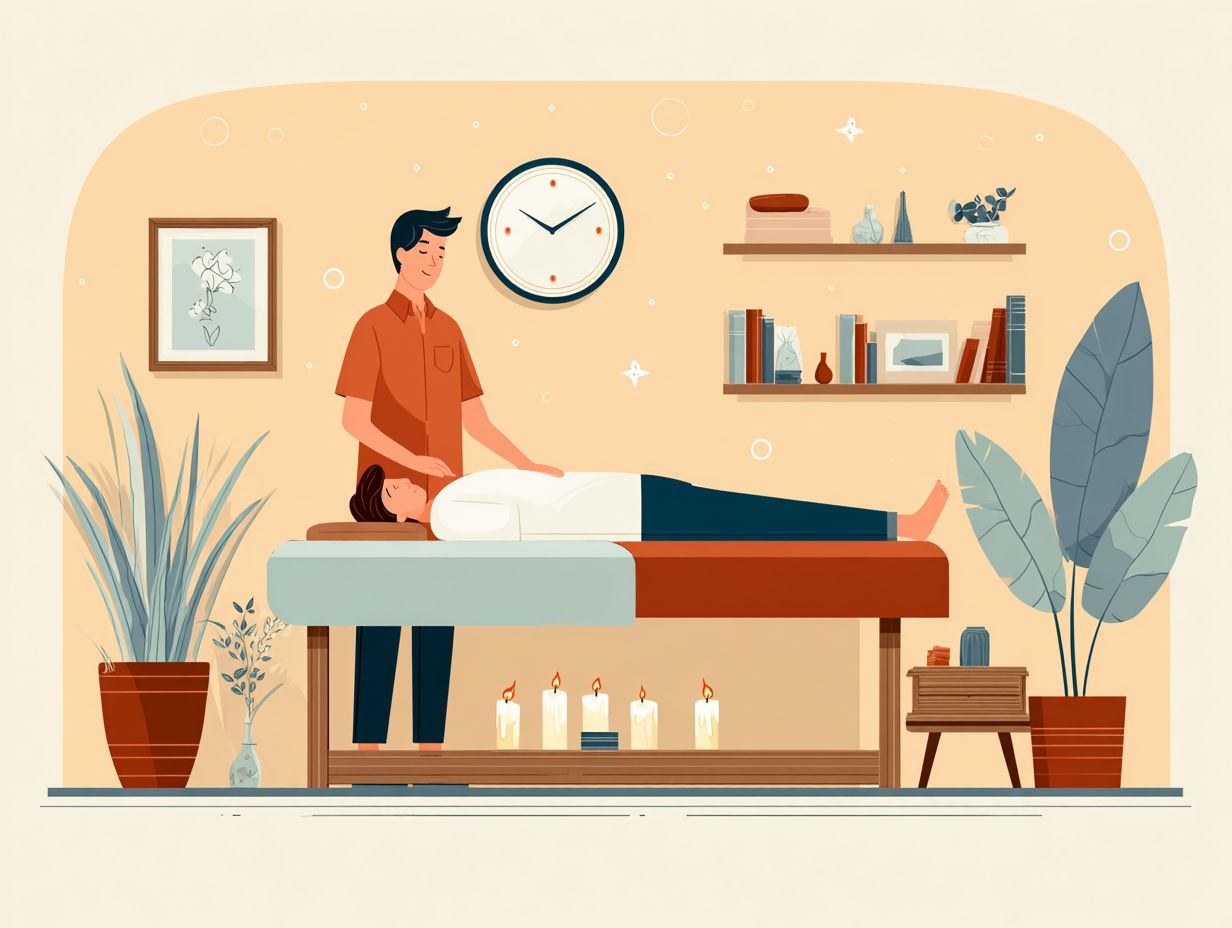
Some patients may opt for acupuncture treatment on an as-needed basis for chronic conditions, using it strategically during flare-ups or periods of increased discomfort to provide targeted pain relief.
This flexibility lets people manage their treatment, adjusting sessions to fit their needs as they change.
For those dealing with ongoing pain, being able to change how often and how strong their treatment is allows them to take an active role in managing their care plan. Instead of following a strict schedule, they can decide when to get treatment based on their symptoms, giving them a feeling of independence.
This focus on patients can create a stronger link to recovery, encouraging people to follow long-term pain control methods that fit their individual ways of living and choices.
Frequently Asked Questions
What is the recommended duration for an acupuncture session?
The recommended duration for an acupuncture session is typically between 30 minutes to an hour. This allows enough time for a thorough evaluation and treatment by the acupuncturist.
How often should I schedule acupuncture sessions?
The frequency of acupuncture sessions depends on the individual’s condition and response to treatment. In general, weekly sessions are recommended for best results, but the acupuncturist may suggest more or less frequent sessions based on the specific needs of the patient.
Can the duration of an acupuncture session vary?
Yes, the duration of an acupuncture session can vary depending on the treatment plan and the acupuncturist’s assessment of the patient’s needs. Some sessions may be shorter or longer than the recommended duration depending on the individual’s condition and response to treatment.
Is there a specific time of day that is best for acupuncture sessions?
There is no specific time of day that is considered best for acupuncture sessions. Some people may prefer morning sessions to start their day, while others may prefer evening sessions to wind down. The most important factor is to schedule the sessions at a time that is convenient for the patient.
Are there any factors that can affect the duration of an acupuncture session?
Yes, many things can influence how long an acupuncture session lasts. These include how complicated the condition is, how the patient reacts to treatment, and the methods the acupuncturist uses. The acupuncturist might set aside more time to talk about the treatment plan.
Is it necessary to continue acupuncture sessions after the symptoms have improved?
It is recommended to continue acupuncture sessions even after symptoms have improved. This helps keep the results steady and avoid health problems later. The acupuncturist might recommend a regular treatment plan to keep you healthy over time.

Sheetal Sharda has a background in CS. She got an interest in Holistic living back in 2018, and has since started exploring more into Naturapathy, Holistic Living, Yoga, and more. She got inspired to start SereneClinics to help people find reliable centers across the world.

